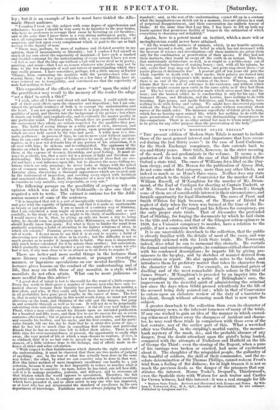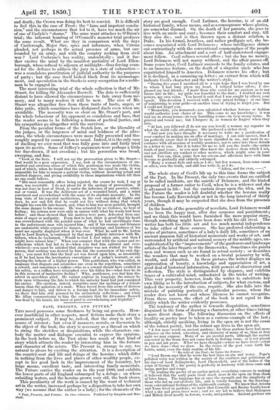TOWNSEND'S MODERN STATE TRIALS. * " TILE present edition of Modern
State Trials is meant to include those of the most general interest and importance that have occur- red during the last thirty years ": in the case of Lord Cochrane, for the Stock Exchange conspiracy, the date extends back to six-and-thirty years. State trials, however, in the strict meaning of the word, do not predominate in the volume. It seems a de- gradation of the term to call the case of that half-witted fellow Oxford a state trial. The cases of Williams for a libel on the Dur- ham clergy, and of Mr. Moxon for the publication of Queen Afab, do not come under that category, more than any other libels, nor indeed so much so as Hone's three cases. Neither does any state interest attach to the trials of Courvoisier for the murder of Lord William Russell, of M'Naughton for the murder of Mr. Drum- mond, of the Earl of Cardigan for shooting at Captain Tuckett, or of Mr. Stuart for the duel with Sir Alexander Boswell ; though some of them are of considerable interest in their circumstances, and furnish opportunity for legal illustration. The cases of Frost and Smith O'Brien for high treason, of the Mayor of Bristol for neglect of duty when the town was burned at the time of the Re- form struggle, and of O'Connell and his fellows for conspiracy, are the only proper state trials. That of Alexander the pretended Earl of Stirling, for forging the documents by which he laid claim to the title and estates, and that of the Glasgow cotton-spinners in 1838, for a Unionist conspiracy to murder, have a relation to the public, if not a connexion with the state. It is one unavoidable drawback to the collection, that the public is already familiar with the details of most of the cases, and was thoroughly sickened with the Irish State trials. Mr. Townsend, indeed, does what he can to surmount this obstacle. He curtails the formal and uninteresting parts ; he combines critical observations with his condensed descriptions ; he imparts life by giving pro- minence to the by-play, and by sketches of manner derived from observation or report. He also appends notes to the trials, and introduces them by prefatory matter that takes its character from the character of the case. For example, an historical précis of duelling and of the most remarkable duels ushers in the trial of James Stuart ; M'Naughton's is preceded by an inquiry into the law regarding insanity, and a notice of Bellingham's case, the improvement in the merciful spirit of' administering the criminal law since the days when Gibbs pressed relentlessly for the life of the accused being duly pointed out ; while in that of Courvoisier he enters upon an elaborate review of the duty of a barrister to his client, though without advancing much that is new upon the subject. A greater drawback to the collection than even its character of contemporary news, is the inherent tameness of many of the trials. If any one wished to gain an idea of the manner in which exceed- ing refinement fritters away the sharpness of incident and charac- ter, he may read these trials in comparison with those even of the last century, nay of the earlier part of this. What a wretched affair was Oxford's, in the stripling's morbid vanity, the mounte- bank mystery of the mask, &c., and the probable absence of any danger, from the doubt attendant upon the pistol's being loaded, compared with the attempts of Nicholson and Hatfield on the life of George the Third : even the stoning of the Regent, when a pane of his carriage was broken or cracked, had more of excitement about it. The slaughter of the misguided people, the gallantry of the handful of soldiers, the skill of their commander, and the re- solute determination of Sir Thomas Phillips, cannot redeem Frost's trial from a feeling of flat dulness; for in high treason it is not so much the previous deeds as the danger of the prisoners that con' stitutes the interest. Home Tooke's, Despard's, Thistlewood's, even the Spafields riots with Watson for arch traitor and Castles for Crown witness, had this interest : it was a real struggle for life • Modern State Trials. Revised and illustrated with Essays and Notes. ByWil- Ham C. Townsend, Esq., M.A., Q.C., Recorder of Macclesfield. In two volumes. Published by Longman and Co.
and death; the Crown was doing its best to convict. It is difficult to feel this in the case of Frost : the " lame and impotent conclu- sion," and the circumstances that led to it, have too much the air of one of Carlyle's " shams." The same want attaches to O'Brien's trial; the inherent humbug of O'Connell's monster trial produces the same result. What are they in comparison with the days of Castlereagh, Major Sirr, spies and informers, when Cutran pleaded, not perhaps in the actual presence of arms, but sur- rounded by an army, and with the country reeking from civil war ? Lord Cochrane's has reality, undoubtedly ; and it fur- ther excites the mind by the manifest partiality of Lord Ellen- borough, whose refusal to adjourn at midnight—thus forcing coun- sel for the defence to address the jury in a state of exhaustion— was a scandalous prostitution of judicial authority to the purposes of party; but the case itself looked black from its mismanage- ment, and speculation in the Stocks is sorry occupation for a noble- man to be engaged in. The most interesting trial of the whole collection is that of Mr. Stuart, for killing Sir Alexander Boswell. The date is sufficiently distant to have allowed the circumstances to fade away from me- mory, and to many readers it will be new. The case of Mr. Stuart was altogether free from those traits of haste, anger, or false pride, which sometimes have disfigured duels even when un- avoidable. The necessity was so clear on Mr. Stuart's part, and the whole behaviour of his opponent so scandalous and base, that the reader seems to be following a drama of poetical justice, and his sympathies go altogether with the survivor. From the peculiar forms of the Scotch law, or the liberality of the judges, or the largeness of mind and boldness of the advo- cates, the whole circumstances were more fully presented and tho- roughly argued by counsel than is usual. Indeed, it is the only case of duelling we ever read that was fully gone into and fairly tried upon its merits. Some of Jeffrey's arguments were perhaps a little too fine-drawn, if not overdone ; but his peroration was broad, sweeping, and fine.
"Look at the facts. I will not say the provocation given to Mr. Stuart—. that would be a poor expression. I say, look at the circumstances of un- merited and atrocious abuse of which this gentleman was made the victim, and of which, when he found that the author was his equal in rank, it was impossible for him to remain a patient victim, without incurring actual and merited disgrace, and giving credibility to those imputations which till then no one could believe.
" His most reasonable offers being rejected, the course he took, I say at once, was inevitable. I do not plead for it the apology of provocation. It was not done in heat of blood, or under the influence of any passion, crimi- nal or venial. It was the deliberate act of a wounded heart, and a mind convinced and overwhelmed with the sense of its absolute necessity. In the long vista of his repeated meditations, in the cool anguish of nights and days, he saw and felt that he could not live without doily, that which brought his own life into hazard, and, what to him was more painful, brought the same danger to his enemy. He was actuated by no violence, no heat of feeling; his actions now were only in unison with what his words had been before ; and these showed that his motives were pure, defecated from any stain of anger or malignity. From first to last, there is proof that his heart was overwhelmed with the painful sense of what he had unwillingly done to the unfortunate man who injured him ; and if his courage and firmness are undeniable while exposed to danger, the relentings and kindness of his heart are equally displayed when it was over. What he said to Mr. Liston and to Lord Rosslyn, is confirmed by that most pathetic interview with Mr. Gibson, when he exclaimed, ' Would to God I had taken aim, and then I might have missed him !' When you compare that with the scenes and re- collections which had led to it—when you find him agitated and over- whelmed—you must be satisfied that slaughter was not wished for by this person, that nothing was desired by him but the restoration of his own dig- nity ; you must feel that the fatal act was forced upon him, as irresistibly as if he had been the involuntary executioner of a judge's warrant, or one obeying the behests of a higher power. This gentleman, who was called, in language that disgusts and astonishes one even in the repetition, sometimes a coward, and sometimes a ruffian—who as a coward should have exulted in his safety, as a ruffian have triumphed over his fallen foe—what does he do in this moment of instinctive feeling ? Why, gentlemen, you find him dis- solved in speechless grief. He cannot express in language the misery he feels upon witnessing the fate to which his unlucky hand had just consigned his enemy. His emotion, indeed, resembles more the meltings of a female bosom than the agitation of a male. When forced from this scene of distress and danger to him, and driven to a foreign land for his immediate safety, we there find him still pursued by his melancholy reflections ; and when Mr. Allan communicates to him the certainty that Sir Alexander Boswell was dead by his hands, his burst of grief is overwhelming and frightful."



























 Previous page
Previous page